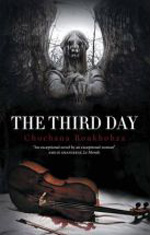

MacLehose Press (UK), paperback, 9780857050977
THE THIRD DAY
Translated from the French by Alison Anderson
Reviewed by Amanda Meale
Distinguished cellist Elisheva and her protégée Rachel arrive in Jerusalem for a three-day visit. The culmination of their sojourn will be a concert performance featuring Rachel as the soloist. On that same day, the third day, Elisheva plans to assassinate The Butcher of Majdanek, her torturer during World War II.
Rachel is returning to Jerusalem after an absence of five years, having not spoken to her father during that time. Her Jewish parents were, and still are, against her studying at the Juilliard School in the USA. Having risked everything in emigrating from Tunisia, Rachel's parents believe that she should now remain in Israel with her own people. As her mother says:"A hundred million Arabs and four million Jews. If we don't stick together we won't make it."
Meeting up with old friends, happily drinking in bars, Rachel misses practice and rehearsals. Even more distracting is the re-kindling of a romance with Eytan, her former boyfriend. Over the three days Eytan will decide whether or not to leave his wife and go abroad with Rachel, the one he truly loves.
Elisheva, meanwhile, is secretly making plans. A weapon is delivered by her godson Daniel, whose mother was also imprisoned at Majdanek. Carlos, an old friend, has arranged for The Butcher to be in Jerusalem at a certain time and place so that the murder can be carried out. Revenge will be exacted not only for Elisheva's suffering but also for the deaths of her family members at Majdanek concentration camp. Memories of the horror permeate Elisheva's existence:
No matter how she tries, she is elsewhere, with the naked skeletons falling by the hundreds
into the trenches they had to dig, skeletons rolling over each other to the shouts of the kapos
and the clatter of machine guns. In a street deep in mud that clung to her shoes, a street
squelching with blood.
It is not the two main characters, however, who make The Third Day so interesting. Each member of the ensemble cast has his or her own story. In another writer's hands this might have seemed mere padding but Boukhobza uses their stories to greatly enrich the narrative. Perhaps the most poignant recounting is that of Daniel's father Amos, once in love with Elisheva. Although married to a woman he never loved, he has remained fiercely loyal.
He will stay by her. It is true. He admits as much. He follows the volatile young woman
into the press of young people settling around the tables for dinner, he hurries, pulls up a
chair¸and offers it to her; she is charmed. After all she has been through—the camps, the
march through the snow, the ship packed with immigrants, the harsh life of the kibbutz—here
is a gentleman who is fussing over her, who finds every way he can to be attentive, who tries to
make her comfortable.
Another lovely aspect to this novel is Boukhobza's evocation of the atmosphere in Jerusalem. References to historical places abound, including "a stairway from the time of Herod." Temples, mosques, statues combine with modern housing to depict a fascinating locale. Daniel loves the market:
The shouts of the vendors, the traffic, the drains of dirty water, the flies on the
slabs of fish and meat tossed onto displays in the heat of the day. For him, this was the
real Jerusalem. He had never understood why these small houses seemed so charming to him,
with their corrugated iron rooks patched with bits of zinc and scrap metal. A little
corner of the shtetl? Perhaps. And yet.
The people of Jerusalem are every bit as colourful as their surroundings—Arabs, Romanians, Poles, Russians and even Spaniards. Of course the Arab-Israeli conflict is mentioned, acknowledging the plights of both sides. Daniel has been involved in two conflicts, the first in 1973: "He had climbed down from the Merkava tank when the thunder of an explosion and a roaring flame hurled him to the ground. When he got to his feet, the Merkava had disappeared. His mates had roasted alive."
A nail-biting finale involves the entire ensemble, and the resolution is dramatic. Although The Third Day deals with some terrible memories, on the whole it is charming and entertaining.
